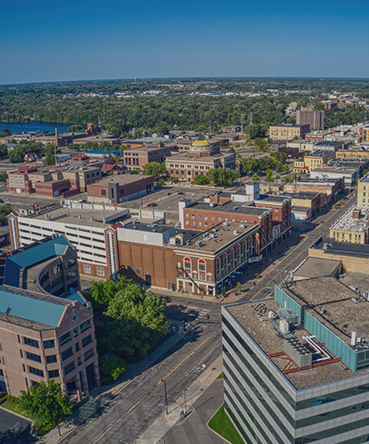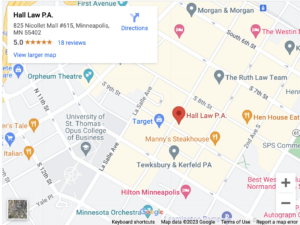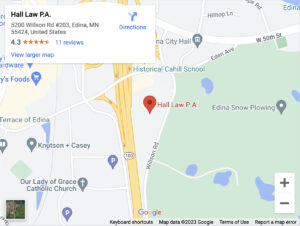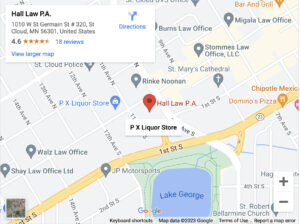
If you lost a loved one in a fatal accident in St. Cloud, MN, an experienced St. Cloud wrongful death lawyer can help you fight to recover compensation for your loved one’s medical bills, loss of financial support, and your pain and suffering. Call Hall Law Personal Injury Attorneys, at (320) 255-1000 to help you fight to recover the fair compensation you deserve.
Our team has over 40 years of experience not only helping grieving families recover fair compensation for their losses, but they have also helped victims involved in motorcycle accidents, 18-wheeler crashes, St. Cloud catastrophic injuries, pedestrian claims, and more. We’d be proud to stand up and fight to help your family get justice.
We know that life is difficult if you’ve lost a family member. Still, it’s important to seek legal advice quickly. Contact our law offices in St. Cloud, Minnesota, to schedule a free consultation today.
How Hall Law Personal Injury Attorneys Can Help With a Wrongful Death Claim in St. Cloud

Dealing with the loss of a loved one can be unbearable. It’s normal to feel overwhelmed, especially when the financial stress of your loss is adding to your burden. When the insurance company refuses a fair deal, it’s important to know that help is just a phone call away.
An experienced St. Cloud personal injury lawyer can help you fight to protect your family’s financial security.
At Hall Law Personal Injury Attorneys, our team has been recognized time and time again for our quality legal services. We’ve been listed as Super Lawyers Rising Stars and earned an AV-preeminent rating from Martindale Hubbell.
Hiring us means you’ll have an advocate to:
- Identify all parties who share blame for your loved one’s death
- Gather evidence to prove your case
- Calculate your case value
- Handle all insurance negotiations on your behalf
- Represent you in court if necessary
Are you ready to learn more? Call for a free consultation with our St. Cloud personal injury attorneys today.
How Common Are Fatal Accidents in St. Cloud?
According to the Minnesota Office of Traffic Safety (OTS), traffic fatalities increased by eight percent in 2020. That year, 394 fatal motor vehicle accidents were reported across the state of Minnesota. 122 of those auto accidents were known to be speed-related.
Fatal workplace accidents also increased in 2021, when 80 work-related fatalities were reported across Minnesota. 67 Minnesota workers were killed on the job in 2020.
Unfortunately, the death rate in Minnesota for falls sustained by older adults is among the highest in the nation.
Overview of Minnesota Wrongful Death Laws
Under Minnesota law, “wrongful death” is any type of death caused by someone else’s wrongful act or omission. You have the right to file a wrongful death lawsuit if your loved one would have been entitled to sue for damages under Minnesota personal injury laws had they lived.
Who Can File an Action for Wrongful Death in Minnesota?
The process of recovering damages for wrongful death can be complicated.
In Minnesota, surviving family members have the right to petition the court to appoint a trustee. It is the trustee who will technically file the wrongful death lawsuit on the family’s behalf. The surviving spouse or next of kin will typically choose a person to act as the trustee, and the court formally appoints that person.
The person who is entitled to petition the court depends on the nature of their relationship to the deceased person.
Examples of the people who may petition for the appointment of a trustee include:
- A surviving spouse
- The deceased person’s parents
- Children, if the deceased person was not married
- Siblings, if the deceased person was unmarried, did not have children, and their parents were deceased
The trustee, once appointed, acts on behalf of the decedent’s surviving family members.
What Causes Most Fatal Injuries?
Serious accidents have the potential to be fatal. Unfortunately, many of these accidents are entirely preventable if people exercise due caution. If someone else was responsible for your accident and injuries, you may be entitled to seek compensation from the at-fault party.
At Hall Law Personal Injury Attorneys, we often handle wrongful death claims involving:
- Car accidents
- Slip and fall accidents
- Medical malpractice
- Motorcycle accidents
- Pedestrian accidents
- Bicycle accidents
- Truck accidents
- Bus accidents
- Uber or Lyft accidents
- Snowmobile accidents
- ATV accidents
- Construction accidents
- Workplace accidents
- Dog bites and animal attacks
- Defective products
- Negligent security
- Nursing home abuse and neglect
- Assault and violence
You deserve to know your legal options if you’ve lost a loved one because someone else was careless. You can take the next step toward learning about your legal rights today. Just call our law firm in St. Cloud to schedule a free case review with our lawyers.
What Is My St. Cloud Wrongful Death Case Worth?
The value of your wrongful death claim will depend on the unique facts of your case, including:
- The cost of your loved one’s medical treatment prior to death
- Your loved one’s age, life expectancy, and earnings prior to death
- Your loved one’s lost future earning potential based on prior work history, education, and other factors
- The identities of surviving dependents and children
- Your family’s pain and suffering
- The circumstances surrounding your loved one’s death
- The strength of your negligence case
Assessing the value of these types of cases can be particularly difficult. After all, how can you put a dollar value on the loss of life?
Of course, the insurance company has teams of experienced professionals who are assessing your case value and working to downplay your losses. You deserve the same type of experienced lawyer in your corner.
At Hall Law Personal Injury Attorneys, we have decades of experience handling complex wrongful death and personal injury claims. We have access to respected experts who can help with the valuation process. Just call our lawyers in St. Cloud to learn more about how we can help today.
What Compensation Can I Recover if My Loved One Was Killed in an Accident in St. Cloud, Minnesota?
Like any personal injury victim, surviving family members are entitled to seek compensation for all of the losses caused by your loved one’s death.
Examples of the types of damages that may be available include:
- Your loved one’s medical bills incurred from the date of the accident until the date of death
- Funeral expenses and burial costs
- Loss of your loved one’s financial support and future earnings
- Loss of retirement benefits and employment benefits
- Loss of companionship (loss of consortium)
- Loss of parental guidance and support
- Pain and suffering
In other words, you can recover both economic damages and non-economic damages. In rare cases where the defendant’s acts were intentional or especially shocking, the court may award punitive damages purely as punishment.
Can I Recover Compensation if My Loved One Is Being Blamed for Causing Their Own Death?
You may be shocked to learn that the person responsible for your loved one’s death is trying to blame them for getting hurt. Unfortunately, this is a common insurance tactic. If the insurance company can pin some of the blame on the deceased person, they can get away with paying less than full compensation.
Minnesota follows modified comparative negligence rules. Under the statute, a victim can only recover compensation if their share of fault is less than the party they are suing for damages. Once their percentage of fault is greater than the defendant’s, they lose their right to seek compensation.
Even if the victim’s share of fault is less than the other party’s, however, their compensation can be reduced in proportion to their share of fault.
How Do I Prove Someone Else Is Responsible for Paying My Family’s Damages?
Most wrongful deaths in Saint Cloud occur because someone was negligent. People who are careless can be held financially responsible for their actions even if they didn’t intend to hurt anyone.
Proving negligence means establishing the following elements:
- The at-fault party’s legal duty of care
- A breach of duty
- Causation, or evidence that the breach caused the death
- The damages sustained by the family
You may not have been present when your loved one was killed. Our St. Cloud wrongful death attorneys will conduct an investigation to determine what happened. Once we gather the evidence, we can identify all parties who may be legally responsible for paying your damages.
How Long Do I Have To File an Action for Wrongful Death in Minnesota?
You have three years from the date of your loved one’s death to file a wrongful death lawsuit in most cases.
While it’s possible that you could have more or less time, the exceptions are rare. For example, you may have additional time to take legal action if criminal charges are pending against the person responsible for your loved one’s death.
Contact a St. Cloud Wrongful Death Lawyer for a Free Consultation
You’re struggling with an unimaginable loss right now. Unfortunately, you don’t have an unlimited amount of time to take legal action. A compassionate St. Cloud wrongful death attorney at Hall Law Personal Injury Attorneys can help you fight for the compensation you deserve. All you have to do is call our law firm for a free consultation today.
Our personal injury law firm in St. Cloud, MN, also provides:
- Bicycle Accident Attorneys in St. Cloud, MN
- Boating Accident Lawyers in St. Cloud, MN
- Brain Injury Attorney in St. Cloud
- Car Accident Lawyer in St. Cloud, MN
- Catastrophic Injury Lawyers in St. Cloud, MN
- Child Injury Attorney in St. Cloud, MN
- Dog Bite Lawyers in St. Cloud, MN
- Motorcycle Accident Lawyer in St. Cloud
- Nursing Home Abuse Attorneys in St. Cloud, MN
- Pedestrian Accident Lawyers in St. Cloud, MN
- Sexual Abuse Lawyers in St. Cloud, MN
- Slip and Fall Accident Attorney in St. Cloud, MN
- Truck Accident Lawyers in St. Cloud, MN



